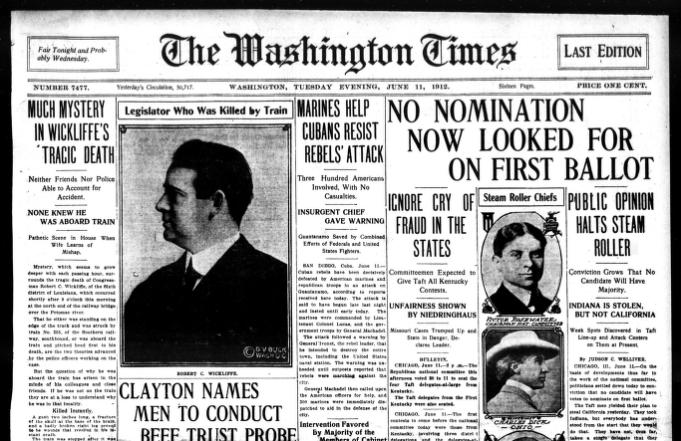|
Moderated by NW Okie! |
Volume 14 , Issue 242012Weekly eZine: (371 subscribers)Subscribe | Unsubscribe Using Desktop... |
100 Years Ago Today - 11 June 1912

In The Washington Times, dated Tuesday evening, 11 June 1912, the headlines one the frontage were: "No Nomination Now Looked For On First Ballot," "Marines Help Cubans Resist Rebels' Attack," "Legislator Who Was Killed by Train," Much Mystery In Wickliffe's Tragic Death," "Clayton Names Men To Conduct Beef Trust Probe," "Railroad's Ships Cannot Use Canal," "Goldsborough party Motors To Chicago."
The Goldsborough party that motored to Chicago concerned the Governor of Maryland, one of the delegates to the Republican national convention. Governor Goldsborough had left Maryland for Chicago in an automobile, traveling with several prominent Maryland Republcans. Governor Goldsborough was extremely optimistic regarding the outcome of the convention, and declared that everything would be adjusted satisfactorily before the business meetings of the great political conference were concluded. All members of the traveling party seemed to coincide with the optimism expressed by their leader.
No Nomination Now Looked For On First Ballot
As most National Conventions goes, there were cries of fraud in the states, in the battle of Republicans Roosevelt and President Taft. Committeemen were expected to give Taft all of Kentucky. The republican national committee voted 38 to 11 to seat the four Taft delegates-at-large from Kentucky.
Chicago, June 11, 1912 -- The first contests to come before the national committee were those from Kentucky, involving three district delegations and the delegates-at-large. It was conceded in Advance that the contests would be awarded Taft by the committee, if it followed the rule set the day before in not going back of the returns of any convention or primary to ascertain whether or not fraud had been perpetrated.
The entire Kentucky contest was based upon the contention of the Roosevelt forces that the Federal machinery used strong-arm methods in several districts and in the State convention to gain control and elect delegates.
Fraud was charged in the attack by Roosevelt forces on the Taft delegates-at-large from Kentucky, W. C. Bradley, James Breathhitt, W. D. Cochran, and J. E. Wood, it was alleged that because of fraud seven counties were prevented from participating in the convention, that the result should be thrown out, and the contesting delegates-at-large seated.
As the Republican National Convention politicians settled down to the conviction that no candidate would have votes to nominate on first ballot. The Taft men yielded their plan to steal California the day before. They took Indiana, but everybody had understood from the start that they would do that. They had not taken a single delegate that they had not listed throughout the fight as their own. Nor a single one that the Roosevelt inside figures did not concede they would take.
There was uncertainty about Missouri. Roosevelt's people were expected to win most of the contests there and they were expected to save the Washington State delegation. Their policy in giving up on Indiana strengthened them in Missouri and Washington. In Indiana they made the concession that a primary ought to be given recognition as prima facie honest, and that was just what they wanted their opponents to admit in Missouri and Washington State.
There were indications that the national committee, under pressure of public opinion, would try to be reasonably decent about Washington. practically all thought of stealing Oregon and South Dakota on technicalities that were given up by the Taftites. petty larceny appeared to be about the caliber of the outfit in charge of the steam roller.
The big, basic question of electing the ticket was being megaphoned at the leaders by thousands of people who were coming into Chicago from the surrounding States, and demanding that the party management be sane.
| View or Add Comments (0 Comments)
| Receive
updates ( subscribers) |
Unsubscribe
| © 2025. Linda Mcgill Wagner - began © 1999 Contact Me | |
